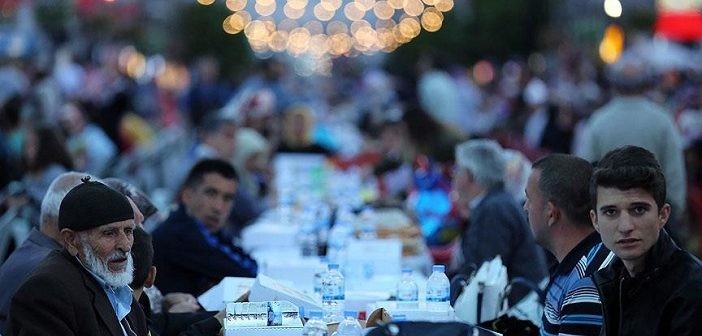
Muraqabah Meaning in Islam
What is the muraqabah of meanin in Islam? How many types of muraqabah are there?
Muraqabah is to reenact the consciousness of ihsan as is defined in the Jibril Hadith:
“Ihsan is to serve Allah as if you see Him. Even if you do not see Him, He surely sees you…” (Muslim, Iman, 1, 5; Bukhari, Iman, 37)
Achieving maturity in Islam and faith depends on acquiring that certain state of ihsan; and in order to live a life of ihsan, with an awareness of being under the Almighty’s constant supervision, we need to run a self-assessment through muraqabah and get our acts together.
The fact that Allah, glory unto Him, is closer to us than ourselves needs to become embedded in our hearts as a steady conviction.
A person has effectively reached ihsan through iman, once his heart begins to pulsate with these feelings. Thereafter, he offers all good deeds with an inspired heart filled with spirituality, becoming immersed in the spiritual zest of contemplating on the Quran, the universe and humanity.
In order to read the entire Quran contemplatively, the disciples of tasawwuf first do an exercise of contemplation on certain verses. Chosen for this are verses which have a greater affect on the heart and reinforce more compellingly the sentiments of feeling the presence of the Almighty and His love. In the Naqshibandi Order, this process of throwing oneself deep into contemplating such verse is called muraqabah.
Muraqabah has four stages:
- Muraqaba-i Ahadiyya
(Contemplation of the Oneness of Allah)
Contemplated here is the chapter al-Ikhlas and the ahadiyyah, that is the oneness of Allah, glory unto Him, who, ascribed with the most perfect attributes, is free of all kinds of deficiencies. It is believed at this stage that inspiration begins to flow into the heart.
The meanings of the verses are to be pictured in the mind without, however, resorting to analogies or seeking to ascribe physical qualities to the Almighty. One only considers these attributes the Almighty is ascribed with. When the picture becomes vague, the verse is repeated and the contemplation begins anew. As this continues, a Believer’s feelings of ihsan increase, as he begins to receive a share of knowledge of Allah.
What chapter al-Ikhlas essentially reminds us of is this: Allah, glory unto Him, is One and Unique. Unity is exclusive to Him alone.
The Almighty does not manifest His Essence in this world. He has the attribute of mukhalafatun’lil-hawadis, that is He does not resemble creation in any way. Whatever there is in the universe we may think of or imagine, the Essence of Allah, glory unto Him, is of greater distinctiveness and supremacy. Our Lord is transcendent; infinitely greater than however we may conceive Him, and of perfection the understanding cannot possibly imagine. As He has no resemblance or opposite, it is impossible to conceive His Essence.
The Almighty is Samad. He stands in need of nothing, whereas everyone and everything stand in need of Him. All forces in the universe belong to Him. Man ought to reflect on the might and majesty of Allah, glory unto Him, and coming to terms with his own weakness, must surrender his entire existence to his Creator. Shedding his ego, he must seek to become a precinct of the manifestation of the Almighty’s attributes of beauty (jamal).
Ahadiyya, or Oneness, does not allow of any division, segregation into parts or any partnership. The Almighty has therefore not been born and has not begotten; there has never been anything equal to Him. He is not a father, a mother or a son as the Christian creed claims. Belief in the Unity of Allah, glory unto Him, does not permit any notion of partnership or birth, for what is born segregates and what segregates is doomed to perish; it faces the same fate as what it begets. Begetting is an activity that belongs to mortals and pertains to the need of prolonging the human race. A need of this caliber would have been a deficiency for Allah, the One, the Samad, the Necessary Being, who is remote from all kinds of faults and flaws.
The heart, the center of contemplation and spirituality, must feel the manifestations and flows of Divine Majesty and Power deep inside and be in a ceaseless state of gratitude.
- Muraqaba-i Maiyya
(Contemplation of Divine Togetherness)
Deeply contemplated during this stage is the meaning of “He (Allah) is with you, wherever you may be…” (al-Hadid, 4). A person gains an understanding of whom he should accompany and this state of mind turns into a consciousness in the heart.
Humanity cannot, in any way, remain outside the knowledge and sovereignty of Allah, glory unto Him, even if one was to hide underground or in the deepest end of the ocean. Every beat of the heart, every breath taken, every object seen and every sound heard proves that the Almighty is constantly with His servants. When their times arrive, the Almighty in fact puts an end to their possession of these abilities as they breathe their last.
Allah, glory unto Him, pronounces:
“Do you not see that Allah knows whatever is in the heavens and whatever is in the earth? Nowhere is there a secret counsel between three persons but He is the fourth of them, nor between five but He is the sixth of them, nor less than that nor more but He is with them wheresoever they are; then He will inform them of what they did on the day of Resurrection: surely Allah is Cognizant of all things.” (al-Mujadalah, 7)
The Almighty is man’s dearest friend, closer to him than his closest kin and relatives; a presence which is apparent through His power as such and the work of His angels. Others can only know one’s external conditions. Not only are they not helpful in each and every aspect, they are unable to solve many problems that may trouble one time and again. Allah, glory unto Him, on the other hand, intimately knows every condition one may find himself in and does as He wills, especially during the moment of death. It is then that one truly comes to terms with the fact that all along there has been no other closer to him than the Almighty. The Quran states:
“Why is it not then that when it (soul) comes up to the throat. And you at that time look on. And We are nearer to it than you, but you do not see.” (al-Waqia, 83-85)
To those who forget the Almighty is with them at all times and those who lack this consciousness, the Almighty sends the following warning:
“They hide themselves from men and do not hide themselves from Allah, and He is with them when they meditate by night words which please Him not, and Allah encompasses what they do.” (an-Nisa, 108)
One who is aware of being accompanied by Allah, glory unto Him, at all times and is conscious that all deeds are under Divine surveillance begins to mind what he or she does and thereby avoids temptation and committing evil.
- Muraqaba-i Aqrabiyya
(Contemplation of Divine Nearness)
“And certainly We created man, and We know what his mind suggests to him, and We are nearer to him than his life-vein,” (Qaf, 16) is the verse contemplated at this level. As suggested by the word aqrabiyya, that is to say ‘closeness’, Allah, glory unto Him, is closer to us than ourselves. He knows our thoughts, intentions and feelings.
Things hidden even to angels entrusted with the duty of recording each and every word spoken, thoughts and decisions that come to the mind, even momentarily, are never secret to the Almighty, for it is He who has created thoughts, like everything else.[1] How can the Creator not know?
It is impossible for one, who properly reflects on this, not to shiver and call oneself to account! Envisioning this verse alone in the heart and the mind would be enough to instill the fear to prevent one from uttering a single word that would displease the Almighty; even from entertaining a malicious thought. This verse is truly sufficient to keep one steady on the path of righteousness and alert with the thought of an impending judgment in the Hereafter.
It is said in chapter al-Anfal that Allah, glory unto Him, enters between a person and his or her heart and regulates ones thoughts and desires if He wills.[2] The Almighty is closer to a person than his or her heart, and closer to and more commanding of the heart than the person is himself. So valid is the power of Allah, glory unto Him, that not only does He enter between a person and others, He also enters between the person and his or her own heart, depriving them, in as little as a moment, of the heartfelt desires he or she may have. Disrupting the will, He may turn a person towards the opposite direction, changing his or her opinions and preferences. When Allah, glory unto Him, therefore raises a curtain between one and his or her heart and invites him or her to death, it is impossible to ignore the call and put up a fight against the command. Human beings can thus never now what awaits them with their next breath. (See, Elmalılı M. Hamdi, IV, 2386-2387, [al-Enfal, 24)
Abu Musa al-Ashari –Allah be well-pleased with him- recounts:
“We were with the Messenger of Allah –upon him blessings and peace- during a journey. As we rose to the hills, we would call out, at the top of our voices, ‘Allah-u Akbar! La ilaha ill-Allah’. Thereupon the Messenger of Allah –upon him blessings and peace- said:
‘Do not force yourselves, Muslims, for you are not calling out to someone deaf or absent. Allah is always with you, closer to you than yourselves.’” (Bukhari, Jihad, 131; Muslim, Dhikr, 44)
As understood by many verses of the Quran and ahadith of a similar nature, the Almighty wants His servants to seek closeness with Him, just as He is ever close to them. It is for that reason the Almighty says, “Prostrate and get closer!”[3]
A person who, through muraqaba-i aqrabiyya, realizes that even the thoughts that cross his mind are known to Allah, glory unto Him, not only tries to keep distant from wrongdoings, but also refrains from entertaining ill feelings and thoughts, striving to keep his intention honest and on a straight path.
As a result of this kind of contemplation, one grows feelings of deep love and closeness with the Almighty.
- Muraqaba-i Muhabbah
(Contemplation of Divine Love)
Contemplated at this stage is the verse “…He shall love them and they shall love Him”, (al-Maida, 54), as a result of which the love of Allah, glory unto into him, grows in the heart. One, thereafter, perceives entire creation with love, simply for the sake of their Creator. The cat lying by the door, the dog strolling around and the green branch hanging down in the garden suddenly grow dear in one’s eye. One feels jubilant, simply upon seeing a blooming flower, knowing that, too, is the blessing of the Almighty. People of this ilk always remain in a genuine state of gratitude. They never hurt anyone and are always quick to forgive others who hurt them, remembering the countless faults they themselves have in the sight of Allah, glory unto Him. How can I have the face to ask forgiveness from the Almighty for my numerous flaws, they say, if I am not even willing to forgive the slightest harm inflicted upon me?
Deserving the forgiveness of Allah, glory unto Him, by continually forgiving others is an indispensable trait of mature believers.
True victory is where a person forgives the cruelty inflicted upon him by another without the slightest ill-feeling.
Forgiving for the sake of Allah, glory unto Him, is one of the greatest manifestations of Divine love. Without efforts like this, any claim of loving the Almighty is just paying lip service.
By contemplating on the aforementioned verse during muraqabah, each believer receives an inspiration in proportion to their understanding, aptitude and sincerity. The believer continues to strive forth to rise to a level where he or she can read the entire Quran contemplatively.
Consequent upon sessions of muraqabah, a person directs one's inner world to the Almighty and keeps ones heart clean from being occupied with anything other than Allah, glory unto Him. The believer esteems the Almighty’s command above everything else; his tongue becomes ever busy with Divine remembrance.
A loyal servant of the Almighty is like a child devoted to his toy. The child sleeps excited with the love of his toy and it is the first thing he thinks of and searches for when he wakes up. Such will be the exact case when one suddenly dies and wakes up, before long, from his grave to make his way to the plane of resurrection. One therefore needs to be careful of the kinds of concerns that cross and occupy the mind right before falling asleep. If it is Allah, glory unto Him, who dominates a person’s thoughts in life, then his death as well as his resurrection will take place with Allah, glory unto Him, and according to His will and pleasure.
Stated in some sayings of the Prophet are the following:
“Humans will be resurrected on the Day of Judgment on the state upon which they had died.” (Muslim, Jannat, 83)
“You shall die the way you live and shall be resurrected the way you die.” (Munawi, Fayz’ul-Qadir, V, 663)
If a person’s desire is actuated toward something other than Allah, glory unto Him, such is the way his death and resurrection will be; stranded without an aid on the Day of Judgment.
Exercising in dhikr and contemplation are essential in order to achieve a perfect state of muraqabah. The Blessed Prophet –upon him blessings and peace- says:
اِحْفَظِ اللّٰهَ تَجِدْهُ تِجَاهَكَ
“Seek Allah so that you may find Him in front of you.” (Ahmed, I, 293)
To fully benefit from muraqabah, contemplation and dhikr, it is necessary to observe their prerequisites and adopt their required manners, which includes looking out for the most peaceful moments for doing them and avoiding moments when the heart is under duress like, when hungry, angry or sleepy.
[1] Allah, glory unto Him, manifests with the attribute Khaliq/Creator in the occurrence of both good and bad. When a person intends on committing a bad deed, the Almighty manifest His attribute as Creator and either allows the person to go through with the deed or prevents him from doing it. This is equally valid in good deeds, too. When a person intends on doing something good, the Almighty, again, manifests His attribute as creator, and either allows the person or prevents him. If prevented, the person still receives a reward for carrying a good intention. In short, it is Allah, glory unto Him, who creates good and evil, yet His pleasure always resides with the good.
[2] See, al-Anfâl, 24.
[3] al-Alâq, 19.
Source: Osman Nuri Topbaş, Contemplation in Islam, Erkam Public.













